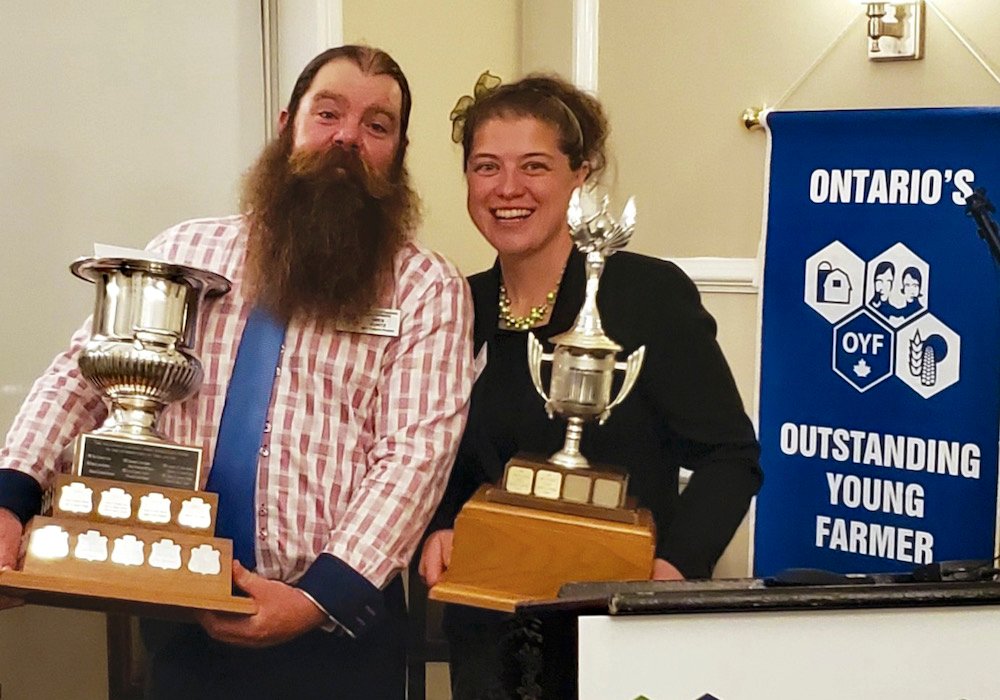Diversified dairy producers named Ontario Outstanding Young Farmers

Jenny Butcher and Wes Kuntz of Little Brown Cow farm are the winners of this year’s Ontario’s Outstanding Young Farmers award.
They run a dairy farm near Brantford, but they also produce beef, process their milk into cheese and fluid milk, and operate a food outlet nearby.
The Outstanding Young Farmers competition was held recently with finalists and judges in person in Ingersoll, and others following live on YouTube. There were three finalists: Butcher and Kuntz, Romy and Ryan Schill and Mike and Danielle Cornelissen.
The Little Brown Cow store has become a destination for people in the area looking for local food and an outlet for other farmers to sell their goods. About 5,000 people per week pass through the store, said Kuntz during their presentation.
Butcher and Kuntz were both raised on dairy farms and started to farm themselves with 20 cows and a focus on maintaining cash flow.
Their farm had a barn that wasn’t built for dairy but Kuntz quit his off-farm job with CanWest DHI at the time to renovate it.
“The end result is a very functional facility, but it isn’t very pretty,” said Kuntz.
The approach exemplifies how Kuntz and Butcher have built their farm — with incremental investments when they can and cash flow emphasized.
With that in mind, they started finishing beef from their Jersey herd and selling it from the farm. They also experimented with processing their own cheese, eventually renovating an old abattoir on their farm to process their own milk. They also purchased a nearby property with a retail outlet that has grown to be a popular local food source.
Butcher says they plan to continue changes to attract visitors to their farm. Could they put go-carts in a freestall barn? Or a slide that runs the height of their silo?
Butcher and Kuntz have shown they are willing to bust conventional wisdom when it comes to dairy farming and direct marketing. Their success resulted in the Ontario’s Outstanding Young Farmers title for 2021. They will compete in the national finals in December in Saskatoon.
Mike and Danielle Cornelissen
Mike and Danielle Cornelissen, of Twin Creeks Greenhouse near Watford, run a greenhouse operation that grew from bare land to 40 acres under glass in five years.
The couple also makes use of methane from a nearby landfill to heat the greenhouse.
The Cornelissens grow bell peppers in their greenhouse because peppers don’t require as much carbon dioxide compared to other vegetables. Methane doesn’t produce as much oxygen as natural gas, so the decision was made to grow peppers.
After quickly scaling to 40 acres, Danielle says they are going to wait before settling on the next expansion. There’s room for up to 80 acres of greenhouse on the property.
The couple met at a summer camp when they were 16 years old. Danielle is from the city, graduated from Western University and earned a degree in business.
Mike attended Ridgetown College and then Olds College in Alberta. He worked in that province for a while before returning home to farm. They married in 2016 and built their first greenhouse.
The Cornelissens have had to scale their use of technology as the farm has grown rapidly in five years. An original packing line was replaced by a new packing line to increase capacity as they moved from 20 to 40 acres of greenhouse.
They now have 64 self-driving carts that help move produce around the greenhouse and are considering automatic sorting technology that isn’t usually used in peppers. And they have implemented an automated scouting machine.
Technology won’t necessarily eliminate people, Mike said, but it can reduce the difficulty of their labour.
Ryan and Romy Schill
Like Butcher and Kuntz and the Cornelissens, Ryan and Romy Schill have taken deliberate steps to grow their business to where it will be sustainable for their family in scale and market access.
Circle R Lamb really started to grow to its current 800 sheep when the Schills built a new barn on their farm in Wellington County. That enabled Ryan to work full time on the farm.
They also raise chickens.
The couple has a goal to serve the community with protein from fast-growing meat lambs.
They also sell breeding stock, which provides them with higher returns than selling animals for meat and they said they also hope it helps improve the sheep industry.
Their lambs for breeding sell out a year in advance and their rams always sell out.
The Schills use an accelerated lambing program so their ewes birth lambs three times in two years. They use extensive record keeping starting at birth and follow the group through to market.
“Lambing is my jam,” said Romy.
Their lambs are marketed to a local processor but also through auction markets.
“During the last eight years the price of lamb has been good,” said Romy. “That’s been really nice.”
The latest differentiator for Circle R Lamb is a move to process and market the wool from their sheep direct to consumers.
This year all their wool clip will be processed and Romy says she could need to start buying wool from other sheep farmers.
Source: Farmtario.com

